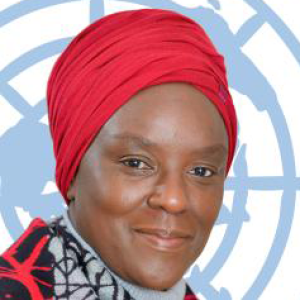Lesotho MEVAL UNODC Training
Opening remarks of the UN Resident Coordinator at the Meval training by the UNODC.
GOOD MORNING, PLEASE ALLOW ME TO PAY MY RESPECTS TO:
HIS MAJESTY KING LETSIE III,
THE RIGHT HONOURABLE PRIME MINISTER,
ALL GOVERNMENT OFFICIALS AND ALL DEVELOPMENT PARTNERS PRESENT HERE TODAY
LADIES AND GENTLEMEN
ALL PROTOCOLS OBSERVED
I am honoured this morning to be speaking to you all and to be giving these opening remarks. This is my first workshop since I arrived in Lesotho four weeks ago. Since then, it has been my honour to meet with different stakeholders all working towards delivering different parts of the sustainable development goals. From civil society to government to private sector and the UN system, it has been inspiring to see how much determination there is to achieve results and ensure that no one is left behind.
But we have only 8 years to achieve this bold agenda. When I consider this fact, I am moved to reflect on the fact that the country needs all available resources to be brought to the table to address the current challenges before us. Allow me to mention a few that have come to my notice since my arrival in Lesotho:
- The high youth unemployment levels in the country
- The increase in the prevalence of gender-based violence – violence against women and girls
- Climate change and its impact on agriculture resulting in food insecurity and ultimately hunger
- The need to further strengthen and ensure that good quality health services are available and accessible to all regardless of social economic status
- In the last 5 years, the economic of Lesotho has become smaller – worsened by the impact of covid 19 which has caused businesses to close, the private sector to shrink and further unemployment
It is clear to all of us that we must do all we can to turn this situation around and work with Basotho to get back on track in achieving sustainable development for all. To do so, it is important to ensure that resources that are needed by the public purse are utilized for development and investment needs of the country.
Illicit financial flows in the form of tax avoidance, money laundering and financing of terrorism all contribute to diverting resources from development that is much needed.
- IFFs threaten the realization of the SDGs in Lesotho
- IFFs affect every stakeholder in the economic cycle and contribute to crippling an already fragile economy
- IFFs contribute to social inequalities that have been further increased by the covid 19 pandemic.
- IFFs are criminal activities that rob people of their right to development and cause immeasurable vulnerability and suffering
It is encouraging to see that the United Nations has made significant attempts to fight money laundering and the financing of terrorism. The establishment of the financial investigation unit (FIU) has been crucial. The unit is important in informing policy direction, conducting research on trends of money laundering and terrorism financing and educating and informing the public on these matters. To this end, allow me to commend the progress that has been made since the publishing of the last mutual evaluation report in 2011 and a mention a couple of achievements:
- Mechanisms are now in place to enable the freezing of terrorist assets and their organizations in line with UN Security Council Resolution 1267 and 1373
- Second, there is now a provision in the Money Laundering Proceeds of Crime Amendment Act requiring reporting entities to pay special attention to high-risk jurisdictions.
Ladies and gentlemen: i wish to recognize the contribution that UNODC has made in assisting the kingdom of Lesotho to strengthen its criminal justice system to be able to combat money laundering and the financing of terrorism.
Through UNODC, Lesotho is now a member of the Asset Recovery Inter-agency Network of Southern Africa (ARINSA), which provides authorities with a platform for the exchange of information in the recovery of proceeds of crime.
The UNODC has also provided investigators, prosecutors and judges with online capacity building programmes.
I encourage authorities and all participants to engage meaningfully over the next three days and share knowledge and understanding of the mutual evaluation process, including the new methodology that the financial action task force (FATF) uses for assessing countries. I also appeal to you all that you would implement what you agree on from the workshop.
In closing, allow me to finish as I started. Illicit financial flows rob nations and people of resources that are critically needed to improve people’s lives and ensure that they can achieve sustainable development for themselves and their children and for generations to come. Youth unemployment, climate change, food security, gender-based violence and many other challenges that the country is going through at the moment can be overcome. Addressing issues of corruption and money laundering is an important aspect of working towards leaving no one behind. I wish you successful deliberations and invite you to do all you can to put the people of Lesotho at the centre of your solutions.
Thank you
Speech by








